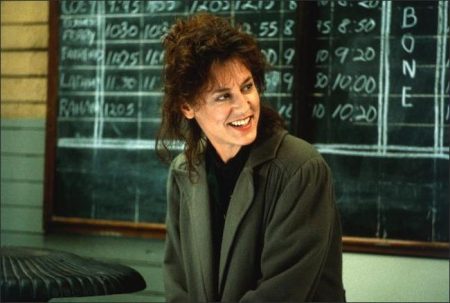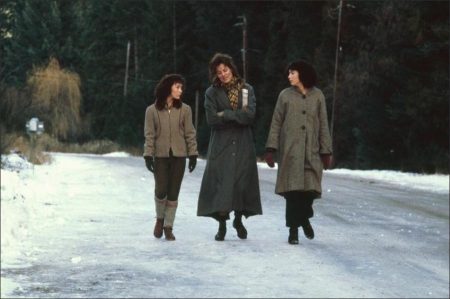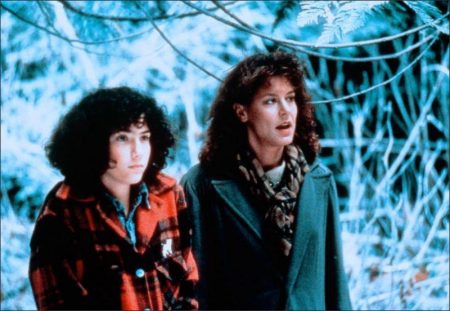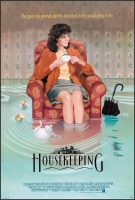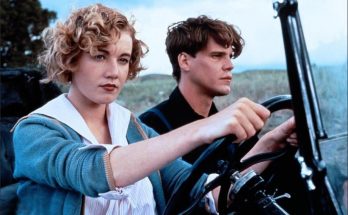Taglines: The story of a woman slightly distracted by the possibilities of life.
Housekeeping movie synopsis. Teen sisters Ruth and Lucille, raised by a grandmother after their mother’s suicide, end up living with an aunt in a western U.S. town called Fingerbone after the grandmother dies. Aunt Sylvie is an unusual woman. She likes to sit in the dark and sleep in the park. Others in town are never quite sure what to make of her. And the same holds true for the girls, even when Sylvie writes elaborate excuses to get them out of school.
Housekeeping is a 1987 American comedy-drama film written and directed by Bill Forsyth and starring Christine Lahti, Sara Walker, and Andrea Burchill. Based on the 1980 novel Housekeeping by Marilynne Robinson, the film is about two young sisters growing up in Idaho during the 1950s.
After being abandoned by their mother and raised by elderly relatives, the sisters are looked after by their eccentric aunt whose unconventional and unpredictable ways affect their lives. Filmed on location in Alberta and British Columbia, Canada, Housekeeping won two awards at the 1987 Tokyo International Film Festival.
Housekeeping was the first North American film by writer and director Bill Forsyth, whose previous films—That Sinking Feeling (1980), Gregory’s Girl (1981), Local Hero (1983), and Comfort and Joy (1984)—were produced in Scotland. Forsyth’s screenplay for the film is based on the 1980 novel Housekeeping by Marilynne Robinson. It was in fact the prospect of bringing the novel to film that brought him to America.
Fllm Review for Housekeeping
“Housekeeping,” Bill Forsyth’s fine adaptation of Marilynne Robinson’s 1981 novel, is a clear-eyed, brow-furrowed, haunting comedy about impossible attachments and doomed affection in a world divided between two kinds of people.
On one side are those who live always in transit. They go through life as if they were passengers in leaky rowboats, riding out a permanent flood. They pass aimlessly through a succession of communities that, for them, remain as unknowable as the interiors of the houses whose roofs they float by.
Straddling the roofs, or hanging onto the upper branches of trees, sometimes looking exceedingly comic in their desperation, are the would-be survivors of the flood, those who persevere in their attempts to impose reason and order on random existence.
To the people in the rowboats they call out warnings of unknown dangers, only to be acknowledged by smiles or shrugs. The smiles and shrugs, roughly translated, mean that anything is better than living one’s life hanging onto a tree.
“Housekeeping,” set in the 1950’s in a small Western town named Fingerbone, is about two sisters, Ruth, 15, and Lucille, 13, who’ve been raised by their grandmother after being abandoned by their voyaging mother. With the death of the old lady, who “spent all her life braiding hair and whitening shoes,” the girls are briefly cared for by two fluttery great-aunts, and then by their mother’s wandering sister, Sylvie (Christine Lahti).
Like their mother, whom they now barely remember, Sylvie is kind and sweet and always a little distant. The girls, in some panic, recognize the symptoms. Sylvie never takes off her coat. When Sylvie leaves the house her second morning home, Ruth and Lucille realize she’s headed for the railroad station and another departure. They trail her and more or less coerce her into staying in town.
Life with Sylvie is unpredictable. It’s just a little too unpredictable for the fastidious Lucille (Andrea Burchill), who’d like to live the way other people do. When Ruth (Sara Walker) or Lucille skips classes, Sylvie writes outrageously dramatic, transparently false descriptions of the illness. Says Ruth, the soundtrack narrator, ”Sylvie’s attitude toward truancy was unsatisfactory.” Sylvie doesn’t much care what the girls do during the day, as long as they don’t hurt themselves.
Her own days are totally without structure. Sometimes she steals a boat and goes for long outings across Fingerbone’s mountain lake, once returning with a fish sticking out of her pocket. She mortifies Lucille by snoozing, like a hobo, in the sun on a park bench in the middle of town. The housework goes undone. Sylvie never throws out old newspapers and has a peculiar fondness for tin cans, once she’s soaked off the labels. Eventually, there are pretty stacks of shiny cans everywhere.
Sylvie takes no interest in her old acquaintances in Fingerbone, but talks with passing strangers, including a woman from South Dakota who, riding the rails, is en route to Portland for her cousin’s execution.
“Why do you get involved with such trashy people?” says Lucille. “I wouldn’t say ‘trashy,” Sylvie replies with utter calm. “She didn’t strangle anybody.” At the end of the day, Sylvie likes to sit in the dark.
About halfway through “Housekeeping,” one may have the awful fear that the movie is going to turn into one of those sentimental comedies – so popular with the squarest Broadway audiences – about the lovability of essentially harmless, noisily self-proclaimed eccentrics.
There’s no need to worry. “Housekeeping,” is far too rigorously observed to slip into such nonsense. Further, in Sylvie, as written and directed by Mr. Forsyth and as played by Miss Lahti, the film has someone who’s neither harmless nor, in reality, merely eccentric. She’s something quite other, possibily quite mad. Though one feels she could function in the world as Lucille wants to and the rest of us do, Sylvie elects not to, with a blithe manner that’s initially engaging and, at the end, profoundly disturbing. She’s a siren of the open road.
Miss Lahti, who was nominated for an Oscar for “Swing Shift,” has the role of her film career to date, and she’s spellbinding. Sylvie is a beauty even when she looks a mess. She enters the movie quietly, as if by a side entrance, so it takes some time to feel the strength of her presence, which, once established, dominates the film. When she’s off-screen, one tends to worry about what she’s up to. When she’s on-screen, one searches for clues to what’s going on in the seeming serenity of her mind.
“Housekeeping,” is by far the most accomplished comedy yet made by Mr. Forsyth, the Scottish director who first came onto the international scene with “Gregory’s Girl” and “Local Hero.” Miss Robinson’s novel has provided him with material in which the mysterious is an essential component of the mundane, and not simply a leavening agent. Though it’s full of moments of real sadness, “Housekeeping,” is also startlingly funny.
Beginning with Miss Lahti, every member of the cast is special. However, pay special attention to Miss Walker, as the tall, gawky Ruth, who walks always with her head down, in shyness, and becomes mesmerized by Sylvie, and Miss Burchill, as the younger sister who longs, with breaking heart, to be totally, boringly ordinary. Mr. Forsyth somehow manages to make us care equally for the sister who chooses to disappear in a passing rowboat, and the one who clings to the roof top, hoping the flood waters will recede.
Housekeeping (1987)
Directed by: Bill Forsyth
Starring: Christine Lahti, Sara Walker, Andrea Burchill, Anne Pitoniak, Barbara Reese, Margot Pinvidic, Bill Smillie, Karen Elizabeth Austin, Betty Phillips
Screenplay by: Bill Forsyth
Production Design by: Adrienne Atkinson
Cinematography by: Michael Coulter
Film Editing by: Michael Ellis
Costume Design by: Mary-Jane Reyner
Set Decoration by: Jim Erickson
Art Direction by: John Willett
Music by: Michael Gibbs
Distributed by: Columbia Pictures
Release Date: November 25, 1987
Views: 240
